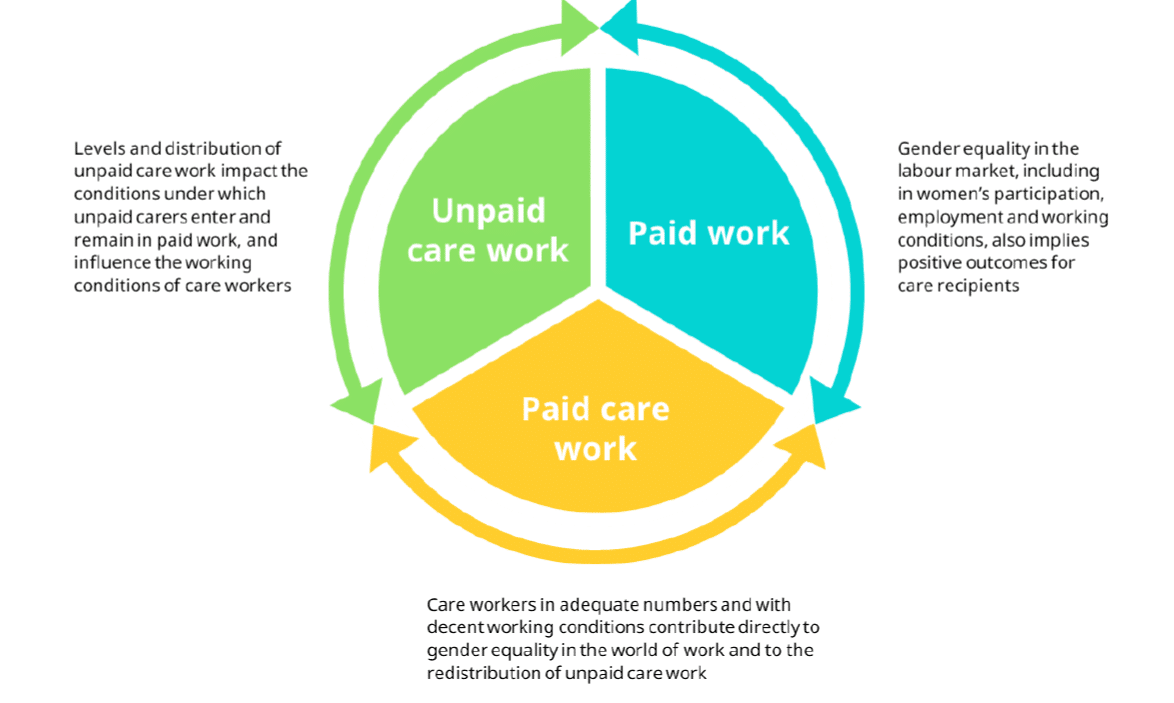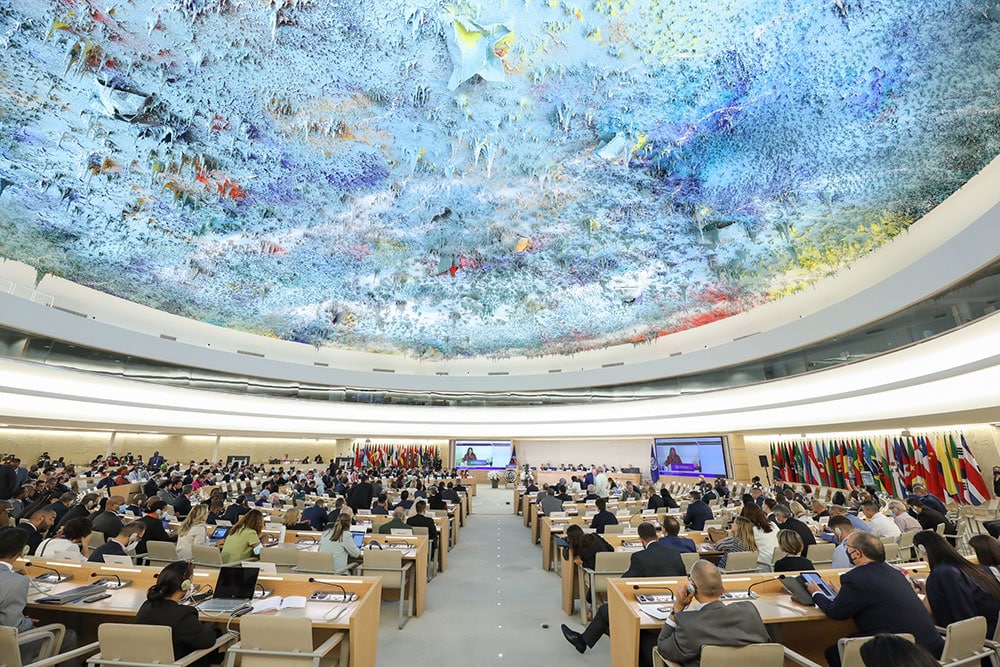The 2024 International Labour Conference (ILC) will include a general discussion on decent work and the care economy. WIEGO, along with sister organizations, will advocate for recognition of care as a public good, the right to care services and social protection for all workers and for social dialogue to ensure decent work in the care economy.
"Care is a public good and a human and labour right,” explains Rachel Moussié, WIEGO’s Director of Programmes and Care Economy Specialist. “Women, migrants and racial minorities are overrepresented within forms of informal, low-paid direct and indirect care work such as domestic work and community care. Like many workers in formal employment, they struggle to access quality care services near their homes and workplaces because they are not available, too expensive and not tailored to their working hours.”
What is Care Work, and Why is it on the ILO’s Agenda?
Care work consists of both paid and unpaid work, and it includes direct and indirect care. It is crucial for the future of decent work. Recognizing its importance in advancing multiple objectives (including gender equality, decent work, and an inclusive recovery from the COVID-19 pandemic), the International Labour Organization (ILO) placed the care economy on this year’s ILC agenda with a view to reviewing developments on care work and reviewing its strategic objectives and priorities.
The ILO Report on Decent Work and Care Economy (prepared for the 2024 International Labour Conference) provides the basis for the ILC general discussion and proposes the 5R Framework for Decent Care Work – a coherent and integrated strategy to: Recognize, reduce and redistribute unpaid care work, and reward and represent paid care work.
Unpaid care work—paid care work—paid work (other than care) circle

Source: ILO. 2024. Decent Work and the Care Economy Report VI
Why is the Care Economy Important for Workers in Informal Employment?
Care is central to human, social and economic well-being, as well as to sustained economic development and decent work. But for many workers, care remains out of reach: Although they represent 61% of the global workforce, workers in informal employment often do not have access to care services or other social protections.
“Women home-based workers are often compelled to work from home, frequently juggling tasks such as working, cooking, and taking care of children, elderly and sick persons, all in the same insecure environment, due to the unfair burden of care work. [This is] a setup that is neither safe nor ideal, and that compromises their productivity and well-being. We demand decent work and care as a fundamental right for workers,” says Suntaree H. Saeng-ging, HomeNet International Executive Committee member.
The same is true for waste pickers who collect, sort, recycle and sell materials that someone else has thrown away: “We [as waste pickers] also need to have the space to care for those who are getting older and for our children. Where do the children stay when we are working on the street or in the garbage dumps? [...] The issue is very important for waste pickers, because we need to be able to work well, knowing that someone is supporting those we love: our children and our elderly,” mentions Severino de Lima Junior, President of the International Alliance of Waste Pickers.
Care work is also an essential source of employment for domestic workers who make up 25% of the global care workforce. Despite being a pillar of the care economy, domestic workers tend to have lower wages, fewer benefits, and fewer legal and social protections than other wage workers. As Adriana Paz, Secretary General of the International Domestic Workers Federation, explains, “Domestic work is care work and should be fully and explicitly recognized as workers, as part of the care workforce and as care providers, covered by national labour codes and protected in equal conditions compared with workers in other occupations. Discriminatory frameworks and practices should be eradicated.”
Key Facts on the Care Economy & the Need for Care Services
|
Worker in Informal Employment Share Policy Proposals to Promote Decent Work in the Care Economy at Global “Parliament of Labour”
During the ILC discussion on decent work and the care economy, WIEGO alongside a delegation of 40 worker leaders and representatives from the International Alliance of Waste Pickers, the International Domestic Workers Federation (IDWF), HomeNet International, Self-Employed Women’s Association of India (SEWA), StreetNet International will be advocating for:
- The right to care services and social protection;
- Extending maternity protections to self-employed workers in informal employment;
- Expanding high-quality public child-care services for workers in informal employment
- Providing long-term care services and social protection for older workers;
- Solidarity with all care workers and their need for labour and social protections; and
- Social dialogue as a critical pathway for shaping and embedding the ILO’s 5R Framework for Decent Care Work.
“Given our contribution to national economies, it is unacceptable that we have no proper care services during our lifetime. It is imperative to ensure high quality care services to all workers, including those in the informal economy, so that we can not just survive, but thrive. [...] We will continue to amplify our voices in these important high level forums because there can be Nothing for Us without Us!” emphasized Lorraine Sibanda, President of StreetNet International.
Background
The 112th Session of the International Labour Conference (ILC) is being held at the International Labour Organization (ILO) Headquarters in Geneva, Switzerland, in June 2024. Government officials, trade union representatives and employers’ associations from 187 countries gather every year in Geneva to develop international labour standards and set the broad policies of the ILO. The agenda for this year’s ILC includes a standard-setting discussion on protection against biological hazards, and a recurrent discussion on the strategic objective of fundamental principles and rights at work. WIEGO and its sister organizations’ priority is to ensure that labour standards adopted at the ILC provide protections for ALL workers, including the world’s two billion workers in informal employment (who make up 61% of the world’s workforce).
Additional Resources
- Global Position Paper from Workers’ Organizations in Informal Employment on Decent Work and the Care Economy – [also available in Spanish, Russian, Portuguese, French]
- International Domestic Workers Federation Position Paper on Domestic Workers and the Care Economy - [also available in Spanish, French and Portuguese]
